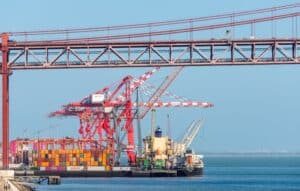I am currently trying to learn Portuguese, a task made more difficult by the fluent English skills of so many locals. I say “bom dia” at the supermarket till, only to receive a perfectly accented “good morning, how are you?” straight back. The fact that many Portuguese tell me their language is really difficult to master isn’t exactly encouraging either!
There is a theory, however, that but for the earthquake that struck Lisbon in 1755, we would all be speaking Portuguese today because it, rather than English, would be the world’s lingua franca.
By the middle of the 18th century, Portugal had already developed into a global power, and arguably would have expanded along the lines of what was to become the British Empire. But the earthquake, the largest ever-recorded natural catastrophe in Europe, wiped out nearly half of Portugal’s GDP and all but destroyed Lisbon, at the time one of the largest and richest European cities.
The Algarve suffered too. Not only did the eruption cause extensive damage and loss of life, it triggered a 60-metre tsunami that swept the coast from Cape St Vincent to Quarteira. According to Lynne Booker of the Algarve History Association: “The wave came in three times and threw up rocks up to 4500kg in weight. At Lagos, the wave dragged down the city wall and most of the houses, throwing boats up to 2 miles inland. Many people sought refuge from the earthquake by fleeing to the beach, and were lost in the tsunami. Albufeira suffered major damage.”
That earthquake is a particularly dramatic example of the way countries can suddenly go into decline, but history is littered with such turning points, usually man-made rather than caused by natural disasters.
China turns its back on the world
In the early 15th century, for example, and almost 100 years before the Portuguese exploded into the Indian Ocean, China also embarked on its own astonishing, albeit brief, age of discovery.
Between 1405 and 1433, China sent out seven gigantic naval expeditions that ventured across the Indian Ocean reaching as far as Africa. Unlike Portugal’s later expeditions, China had no territorial ambitions, and these voyages were simply designed “to display China’s might to all the kingdoms and trade ports of the Indian Ocean world and to bring back exotic toys and novelties for the emperor.” For a variety of reasons, the trips suddenly came to an end and China turned inward for centuries.
However, as the historian Kallie Szcepanski says, it is still tempting to muse on the “what if” questions: “What if the Chinese had continued to patrol the Indian Ocean? What if Vasco da Gama’s four little Portuguese caravels had run into a stupendous fleet of more than 250 Chinese junks of various sizes, but all of them larger than the Portuguese flagship? How would world history have been different, if Ming China had ruled the waves in 1497-98?”
More recently, the fall of Singapore to the Japanese in February 1942, shattered the aura of British invincibility in the Far East and began the astonishingly rapid process in which the largest empire the world has ever seen began to unravel.
Rising China
Today it is possible to conjecture on turning points across the world. Most are well known and are taking place over decades rather than in one fell swoop.
China’s astonishing economic transformation over the past few decades has been well documented. By 2030, Standard Chartered, an international bank, predicts China will have the world’s largest economy, while India will be in second and the USA in third place (see table).
Meanwhile, Japan, currently the world’s third largest economy, is in dramatic relative decline. Standard Chartered forecasts the country will fall to ninth place by 2030, having been overtaken by the likes of India, Indonesia, Turkey, Brazil and Egypt. This was written of Japan back in 2012 but remains as pertinent today: “Everybody knows Japan is in crisis. The biggest problems it faces – sinking economy, aging society, sinking birth rate, radiation, unpopular and seemingly powerless government – present an overwhelming challenge and possibly an existential threat.”
Has eurozone membership triggered Germany’s decline?
But what of Germany, the eurozone’s powerhouse and currently the fourth-largest global economy? The country is generally regarded as a super-efficient, exporting machine that has reaped huge rewards from the introduction of the euro back in 1999. But could membership of the eurozone actually cause Germany’s downfall?
One banker made this comparison to me: “Germany is like a highly successful football team that has won the championship year after year but has neglected to freshen up its squad. Its first team is now full of players in their mid-30s and it is doomed to slowly sink down the rankings.”
The problem is that Germany’s exporting success, much of it emanating from membership of the eurozone, has bred complacency. The key car industry, crucial to the economy, is particularly vulnerable.
According to the newspaper Handelsblatt Today, “Germany’s car giants bet so heavily on diesel – helped in part by falsified emissions data – that they failed to grasp the changes on the horizon”. Moreover, they have fallen behind Tesla of the US in electric vehicles while China is rapidly closing the gap, and is poised to make great leaps in self-driving cars.
But remember, these are just forecasts. In the 1970s, economists confidently predicted that Japan’s astonishing post-war economic ascent would continue for decades, and that China would remain a communist backwater. And in the 1960s, a well-known economic textbook had a graph depicting one country’s GDP climbing steadily higher and eclipsing that of the USA in the 1980s. Remind me again, whatever did happen to the Soviet Union?
World’s biggest economies by GDP in 2030
1. China $64.2 trillion
2. India $46.3 trillion
3. USA $31 trillion
4. Indonesia $10.1 trillion
5. Turkey $9.1 trillion
6. Brazil $8.6 trillion
7. Egypt $8.2 trillion
8. Russia $7.9 trillion
9. Japan $7.2 trillion
10. Germany $6.9 trillion
Source: Standard Chartered, January 2019
By Anthony Beachey
|| features@algarveresident.com
Anthony Beachey is a former BBC World Service journalist now working on a freelance basis in Portugal, where he specialises in economics and finance.



















